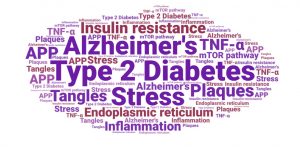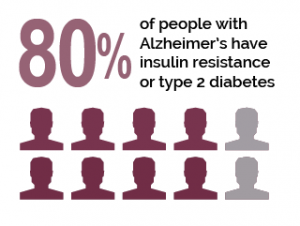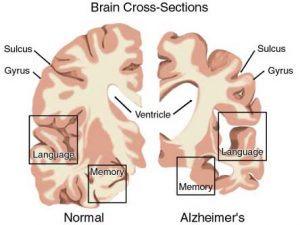
It is no secret that Alzheimer’s Disease can be debilitating to an individual as well as to their loved ones. People look for genetic ties to the disease and early signs of memory loss or decline. However, what if there are more connections to Alzheimer’s other diseases that we thought? Below we discuss Alzheimer’s Disease and Type 2 Diabetes, the connection between them, and why this connection really matters.
Alzheimer’s Disease: What is it, really?
Alzheimer’s Disease (AD) is a progressive disease of the brain which destroys memory and cognitive and mental functions. AD accounts for 60 to 80 percent of  dementia cases, according to the Alzheimer’s Association. Unfortunately, the cause of AD is still not greatly understood despite years of research. This is mainly because of the multiple factors that contribute to AD. With other diseases, researchers have found one to two causations for that disease. But AD has so many possible causations that there is no set cure. Symptoms for AD include difficulty in remembering events, in finding commonly used words, in multiple-step tasks as well as signs of depression, agitation, and apathy.
dementia cases, according to the Alzheimer’s Association. Unfortunately, the cause of AD is still not greatly understood despite years of research. This is mainly because of the multiple factors that contribute to AD. With other diseases, researchers have found one to two causations for that disease. But AD has so many possible causations that there is no set cure. Symptoms for AD include difficulty in remembering events, in finding commonly used words, in multiple-step tasks as well as signs of depression, agitation, and apathy.
Type 2 Diabetes:
Type 2 Diabetes is a metabolic disorder where your body either does not produce enough insulin to maintain glucose level or it resists the effect of insulin. Doctors find Type 2 Diabetes in patients by looking at laboratory tests of glycemia levels. Symptoms for Type 2 Diabetes can range from blurred vision, increased hunger and thirst, and fatigue. Similar to Alzheimer’s Disease, there is no cure for Type 2  Diabetes. However, in contrast to Alzheimer’s Disease, people with Type 2 Diabetes can manage their disease well by exercise, a healthy diet, and insulin therapy and medication.
Diabetes. However, in contrast to Alzheimer’s Disease, people with Type 2 Diabetes can manage their disease well by exercise, a healthy diet, and insulin therapy and medication.
How are these two connected?
Many longitudinal research studies have shown that adults with Type 2 Diabetes have a higher risk of developing Alzheimer’s Disease later on. There have also been studies showing that Type 2 Diabetes may develop due to a high-fat and high-sugar diet as well as obesity. These studies have been helpful in linking factors such as poor diet to high blood sugar and high blood sugar to inflammation in the brain. In both diseases, insulin and inflammation play major roles in the development. In AD, amyloid-beta plaques require more production and eventually lead to response in the cell to maintain overproduction. This inflammation can lead to more production of cytokines and eventually to stress and cell death, which is common is brains of AD patients. You can see the outcome of cell death in the cross-section pictures of the brain where the AD brain has deteriorated greatly. Inflammation in Type 2 Diabetes mainly is derived from over-nutrition or overeating. This excess nutrition induces insulin resistance, thus adding to one of the biggest problems in Type 2 Diabetes.
Studies have show that insulin interacts with amyloid-β protein and tau proteins. These are the proteins that eventually make up those plaques and neurofibrillary tangles that are found in brains of those with Alzheimer’s Disease, especially those with early-onset Alzheimer’s Disease. Combining this information with the face that people with insulin resistance in their body has 5-7 times more insulin than a body without insulin resistance. To learn more about insulin and its connection to these two diseases, watch this video. https://www.youtube.com/watch?v=NlbdMb8oGDo
So what?
Some might be wondering why all of this matters. Why should we care about the link between these diseases, especially if there aren’t any members of our families that have a history of Alzheimer’s Disease or show signs of Type 2 Diabetes? The answer is that this matters for our health and for our loved ones. Most people reading this have witnessed, first-hand, the impact that Alzheimer’s Disease and dementia have on the one enduring it as well as those surrounding the patient. This disease affects far too many aging people. In addition, this matters to people dealing with Type 2 Diabetes. If one has been struggling with this disease for a decade and is beginning to struggle to retrieve short-term memories, this can be incredibly alarming to them. Informing people about the warning signs of the two diseases as well as the connection between them can alert their families to focus more on diet, exercise, and being mindful of the factors leading to these two diseases. As research continues to develop for these diseases, our hope is the community surrounding those suffering will be willing to be more proactive.